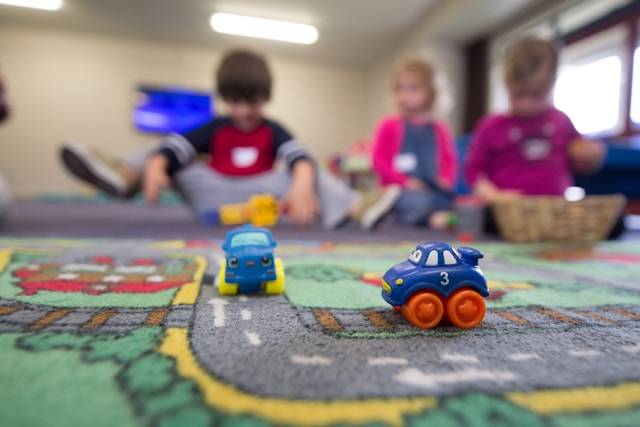Early childhood education lays the foundation for a child’s future learning and development. The first five years of a child’s life are crucial for cognitive, social, and emotional growth. Parents and caregivers seek quality early education programs, but understanding what truly matters in this stage can be overwhelming. Beyond basic academic instruction, effective programs nurture a child’s curiosity, foster critical thinking, and promote social skills.

The Importance of Play-Based Learning
For young children, learning through play is important. This approach promotes creativity and enhances motor skills and cognitive development. Play-based learning allows children to explore their surroundings and discover new concepts freely. By engaging in imaginative activities, children learn to solve problems and work collaboratively with peers.
This form of learning fosters enthusiasm and curiosity about the world, which are critical for lifelong learning. When parents consider a program, they should evaluate how much emphasis is placed on play and exploration. Special attention should be given to how educators facilitate these experiences, as they play a crucial role in guiding children’s learning through these engaging activities.
The Role of Qualified Educators
Qualified educators significantly impact the quality of early childhood education. They should possess the necessary credentials, and exhibit a passion for teaching and an understanding of child development. Trained professionals are equipped with strategies to create an inclusive and stimulating environment tailored to the needs of each child. Teachers should maintain open communication with parents to foster a supportive community.
It’s vital to observe how educators interact with the children during a visit to the program. Engaging educators who encourage independence, nurture curiosity, and respond to children’s needs can greatly enhance the educational experience. Programs staffed with skilled professionals foster a climate of trust and safety, allowing children to thrive and explore their interests effectively.
The Environment Plays a Key Role
The physical environment of an early childhood education setting impacts how children interact and engage with learning materials. Classrooms should be designed to promote exploration and discovery, featuring age-appropriate resources and flexible spaces. Access to outdoor learning areas is equally important and allows children to connect with nature, enhancing their development. A supportive environment encourages children to feel secure, allowing them to express themselves freely.
Elements such as natural light, a variety of textures, and interactive spaces cater to diverse learning styles. A well-structured environment attracts children and keeps them engaged and motivated to learn. Research emphasizes the correlation between a stimulating atmosphere and a child’s willingness to participate, learn, and explore.
Curriculum and Learning Standards
A robust curriculum is pivotal in shaping a child’s learning experience. Early childhood education should balance structured learning and children’s natural interests. Programs should demonstrate a commitment to a developmentally appropriate curriculum aligning with recognized learning standards. This ensures children gain important skills in literacy, math, and socio-emotional development during these formative years.
Parents should look for programs that provide clear outlines of their curriculum, showcasing how they integrate play and exploration into learning. The effectiveness of a curriculum can often be seen in how eager children are to learn and participate. Regular assessments and ongoing evaluations can further ensure the continual growth and adaptability of the curriculum based on the evolving needs of the children. Programs that prioritize a comprehensive curriculum create a harmonious blend of learning and play, fostering well-rounded development.
Parental Involvement and Support
Parental involvement is linked to improved outcomes for children in educational settings. Research suggests that when parents actively participate in their child’s education, children are more likely to excel academically and socially. Early childhood education programs should encourage family engagement through regular communication, workshops, and volunteer opportunities.
This connection creates a support system that extends beyond the classroom, reinforcing learning at home. Parents should feel empowered to ask questions and share their insights with educators. If parents feel uncertain about the cost of quality education, they can use this free childcare subsidy calculator to better understand potential support options. A collaborative relationship enhances the educational process, allowing families and educators to work toward common goals for each child’s growth. Programs that emphasize strong parent-teacher partnerships cultivate an enriching environment conducive to children’s development.
Assessing Long-Term Impact
Choosing an early childhood program involves understanding its long-term benefits. Research has shown that quality early childhood education leads to better academic performance and improved social skills later in life. Children who attend high-quality programs are often more prepared for the transition to formal schooling. They tend to have higher graduation rates and better career prospects compared to peers who lacked such early educational opportunities.
It is important for parents to evaluate the track record of potential programs, looking at indicators such as alumni success, parent testimonials, and the satisfaction of both educators and families. Programs committed to ongoing monitoring and evaluation demonstrate dedication to continual improvement, ensuring children receive the best education possible to set them up for a successful future.
 Choosing the right early childhood education program is a complex yet crucial decision for families. By prioritizing play-based learning, qualified educators, a supportive environment, a robust curriculum, parental involvement, and long-term impacts, parents can ensure they select a program that lays a strong foundation for their child’s future.
Choosing the right early childhood education program is a complex yet crucial decision for families. By prioritizing play-based learning, qualified educators, a supportive environment, a robust curriculum, parental involvement, and long-term impacts, parents can ensure they select a program that lays a strong foundation for their child’s future.










